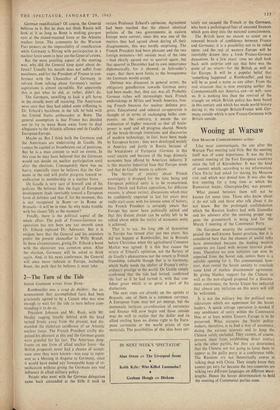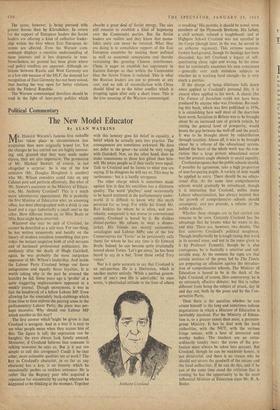Wooing at Warsaw
OUR MOSCOW CORRESPONDENT writes:
Like most communiqués, the one after the Warsaw Pact meeting said little. But the meeting itself was of some importance. It was the first summit meeting of the East European countries since the fall of Khrushchev. It was the kind of summit which, according to my information, Chou En-tai had asked for during his Moscow visit and which was denied him. It was also the first meeting for a long time at which the Rumanian leader, Gheorghiu-Dej, was present.
What passed between them will not be known for some time. Those who know about it do not talk and those who talk about it do not know. But the prolonged confabulation which the Russian leaders had with Gomulka and his advisers after the meeting proper sug- gests the groundwork is being laid for the March 1 meeting of the Communist Party.
On European security the communiqué re- peated the well-known Soviet position, but it is considered here that the chances of useful talks have diminished because the leading western countries are faced with serious internal prob- lems. Therefore no new initiative can now be expected from the Soviet side, unless there is a suitable opening for it. The communiqué, how- ever, does reveal the Soviet anxiety to conclude • some kind of nuclear disarmament agreement. By giving blanket support for the Chinese as well as the non-aligned proposal for a disarma- ment conference, the Soviet Union has indicated that almost any initiative on this score will still be welconied.
It is not the military but the political con- siderations which are uppermost for the Soviet leaders. A quick salvage operation is needed if any semblance of unity within the Communist bloc or at least within Eastern Europe is to be preserved. What occupies the. Soviet policy- makers, therefore, is to find a way of accommo- dating the various interests and to keep the Chinese safely excluded. They cannot, of course,
prevent them' from establishing direct contact with the other parties, but they are determined
that the Chinese are not going to force them to
appear as the guilty party at a conference table. The Russians are not theoretically averse to talking shop with China. They simply know they cannot get very far because the two countries are talking two different languages on different wave- lengths. Hence the Soviet determination to hold the meeting of Communist parties soon.
The game, however, is being pursued with greater finesse than by Khrushchev. In return for the support of European leaders the Soviet leaders are offering a kind of collective leader- ship within the bloc where East European in- terests are affected. Even the Warsaw com- munique displays a sensitive understanding of these interests and is less dogmatic in tone. Nevertheless, no ground has been given where real policy conflicts are apparent. Although re- lations between Russia and West Germany are at a low ebb because of the MLF, the demand for recognition of East Germany has not been voiced, thus leaving the way open for better relations with the Federal Republic.
The Warsaw communiqué therefore should be read in the light of inter-party politics which absorbs a great deal of Soviet energy. The aim still remains to establish a kind of hegemony over the Communist parties. But the Soviet leaders are realists and they know that mono- lithic unity can never be restored. What they are doing is to consolidate support of the East European countries by making them political as well as economic concessions and thereby restraining the growing Chinese interference. China is eager to establish her supremacy in Eastern Europe so that within the Communist bloc the Soviet Union is isolated. This is what the Russian leaders are out to prevent at any cost, and no talk of reconciliation with China should blind us to the bitter conflict which is irrupting again after only a short truce. This is the true meaning of the Warsaw communique.



































 Previous page
Previous page